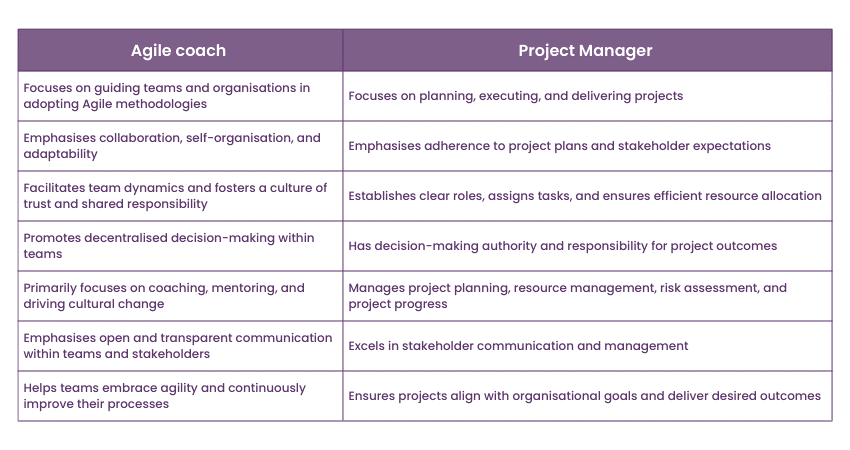We may not have the course you’re looking for. If you enquire or give us a call on 01344203999 and speak to our training experts, we may still be able to help with your training requirements.
Training Outcomes Within Your Budget!
We ensure quality, budget-alignment, and timely delivery by our expert instructors.

Modern organisations are increasingly adopting Agile Methodologies to enhance their productivity, efficiency, and overall project success. Within this context, two key roles emerge: the Agile Coach and the Project Manager. While both positions contribute to Project Management, they have distinct responsibilities and approaches. This blog provides a comprehensive comparison for Agile Coach vs Project Manager, shedding light on their roles, responsibilities and differences.
Table of Contents
1) Who is an Agile Coach?
a) Skills and qualifications required
b) Roles and responsibilities
2) Who is a Project Manager?
a) Skills and qualifications required
b) Roles and responsibilities
3) Agile Coach vs Project Manager: Key differences
a) Focus and approach
b) Team dynamics
c) Decision-making authority
d) Scope of work
e) Communication and collaboration
4) Conclusion
Who is an Agile Coach?
An Agile Coach is a specialised professional who focuses on guiding teams and organisations in adopting and implementing agile principles and methodologies. An Agile Coach acts as a mentor, facilitator, and trainer, fostering an environment of continuous improvement and collaboration. An Agile Coach is required to have several skills and qualifications and is tasked with a number of responsibilities, all of which we will delve into.
Skills required
To be an effective Agile Coach, individuals should possess the following skills and qualifications:
1) Deep understanding of agile methodologies and frameworks
2) Excellent communication and interpersonal skills
3) Strong facilitation and coaching abilities
4) Proficiency in conflict resolution and problem-solving
5) Leadership and team-building skills
6) Continuous learning mindset
Roles and responsibilities
Agile Coaches have various responsibilities, including:
1) Educating teams on agile principles and frameworks (such as Scrum or Kanban)
2) Assisting with the adoption of agile practices and methodologies
3) Facilitating meetings, workshops, and retrospectives
4) Providing guidance on agile tools and techniques
5) Mentoring individuals and teams to improve collaboration and self-organisation
6) Identifying and addressing obstacles to agility

Who is a Project Manager?
A Project Manager is held responsible for the planning, executing, and monitoring of projects to achieve specific goals within defined constraints. They oversee the entire project lifecycle, from initiation to closure, ensuring successful project delivery.
Skills required
Project Managers should possess the following skills and qualifications:
1) Project management knowledge and experience
2) Strong organisational and planning skills
3) Effective communication and stakeholder management abilities
4) Risk assessment and mitigation expertise
5) Leadership and team management capabilities
6) Proficiency in project management software
Roles and responsibilities
Project Managers have diverse responsibilities to ensure project success. They are held responsible for:
1) Planning projects and setting objectives
2) Allocating and managing resources
3) Coordinating and tracking tasks
4) Identifying and mitigating risks
5) Communicating with stakeholders
6) Managing project budgets
7) Ensuring quality control
8) Resolving issues and conflicts
9) Monitoring project progress
10) Providing team leadership
Now that we are done with outlining the skills and responsibilities for both Agile Coaches and Project Managers, let us move onto a detailed comparison for Agile Coach vs Project Manager.
Want to take your project management skills to new heights? Explore our Project Management Courses | Training and Certifications and boost your career!
Agile Coach vs Project Manager: Key differences
When it comes to project management, Agile Coaches and Project Managers have distinct roles and approaches. Understanding the key differences between them is crucial for organisations to make informed decisions about which role best suits their project needs. So, what is the difference between a Project Manager and an Agile Coach? Let's find out.

Focus and approach
Agile Coaches focus on guiding teams and organisations in adopting agile methodologies. They aim to create a culture of continuous improvement, collaboration, and adaptability. By emphasising self-organisation and encouraging teams to make collective decisions, Agile Coaches foster an environment where individuals take ownership and work together towards project success.
On the other hand, Project Managers have a broader scope that encompasses planning, execution, and monitoring of projects. Project Managers are known to prioritise delivering projects on time, within budget, and meeting stakeholder expectations. Project Managers also follow structured project management methodologies and ensure that projects align with organisational goals.
Team dynamics
Agile Coaches place significant importance on team dynamics and self-organisation. They empower teams to work collaboratively, encouraging trust, communication, and shared responsibility. Agile Coaches foster an environment where team members feel empowered to contribute their expertise and ideas, leading to increased engagement and productivity.
Project Managers also value teamwork, but they have a more structured approach. They establish clear roles and responsibilities, assign tasks, and ensure efficient resource allocation. Project Managers may have a hierarchical authority structure within the team, where they make key decisions and provide guidance to team members.
Decision-making authority
Agile Coaches promote decentralised decision-making within teams. They encourage collaborative decision-making processes, allowing team members to contribute their insights and expertise. Agile Coaches facilitate discussions and help teams make informed decisions collectively. This approach taken by Agile Coaches empowers team members and fosters a sense of ownership and accountability.
Project Managers, on the other hand, typically have more decision-making authority. They are responsible for project planning, risk assessment, and stakeholder management. Project Managers make crucial decisions based on project requirements, constraints, and stakeholder expectations. Their role involves balancing various factors to ensure project success.
Scope of work
The scope of work for Agile Coaches primarily revolves around facilitating agile practices and guiding teams in adopting agile methodologies. Agile Coaches focus on coaching, mentoring, and training team members to improve collaboration, communication, and self-organisation. Agile Coaches are also responsible for helping teams embrace agile principles and continuously improve their processes.
Project Managers have a broader scope that includes various aspects of project management. They oversee the entire project lifecycle, from initiation to closure. Project Managers handle project planning, resource management, risk assessment, and monitoring project progress. Project Managers are also in charge of ensuring projects are delivered on time, within budget, and according to stakeholder requirements.
Communication and collaboration
Agile Coaches emphasise open and transparent communication within teams and stakeholders. Agile Coaches facilitate effective collaboration, encourage information sharing, overcoming agile challenges creating a feedback loops to improve project outcomes. Agile Coaches also foster a culture of trust and psychological safety, where team members feel comfortable expressing their opinions and ideas.
Project Managers excel in stakeholder communication and management. They ensure that stakeholders are engaged, informed, and aligned with project objectives. Project Managers communicate project updates, manage expectations, and address potential conflicts. Project Managers should also have strong interpersonal skills to navigate various stakeholder relationships and ensure project success.
Sign up for our Digital Services Project Manager (CDSPM) Course and lead successful digital projects!
Conclusion
All in all, Agile Coaches and Project Managers have distinct roles in project management. While Agile Coaches promote agile methodologies and continuous improvement, Project Managers excel at planning and executing projects. By leveraging their expertise in their respective domains, organisations can achieve project success by adopting the right approach for their specific needs. Hope this blog provided you with all you needed to know about Agile Coach vs Project Manager!
Gain a comprehensive understanding of Agile methodologies with our Agile Overview Course – register today and embrace agility!
Frequently Asked Questions
Upcoming Project Management Resources Batches & Dates
Date
 Agile Project Management Foundation (AgilePM®)
Agile Project Management Foundation (AgilePM®)
Mon 13th May 2024
Mon 20th May 2024
Tue 28th May 2024
Mon 3rd Jun 2024
Mon 10th Jun 2024
Sat 15th Jun 2024
Mon 17th Jun 2024
Mon 24th Jun 2024
Mon 1st Jul 2024
Mon 8th Jul 2024
Sat 13th Jul 2024
Mon 15th Jul 2024
Mon 22nd Jul 2024
Mon 29th Jul 2024
Sat 3rd Aug 2024
Mon 5th Aug 2024
Mon 12th Aug 2024
Mon 19th Aug 2024
Tue 27th Aug 2024
Mon 2nd Sep 2024
Sat 7th Sep 2024
Mon 9th Sep 2024
Mon 16th Sep 2024
Mon 23rd Sep 2024
Mon 30th Sep 2024
Sat 5th Oct 2024
Mon 7th Oct 2024
Mon 14th Oct 2024
Mon 21st Oct 2024
Mon 28th Oct 2024
Sat 2nd Nov 2024
Mon 4th Nov 2024
Mon 11th Nov 2024
Mon 18th Nov 2024
Mon 25th Nov 2024
Mon 2nd Dec 2024
Mon 9th Dec 2024
Sat 14th Dec 2024
Mon 16th Dec 2024







 Top Rated Course
Top Rated Course


 If you wish to make any changes to your course, please
If you wish to make any changes to your course, please


